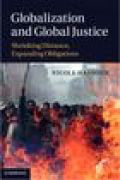
Globalization and global justice: shrinking distance, expanding obligations
Hassoun, Nicole
This book shows how globalization shrinks distance, thereby expanding international obligations to aid the poor and make free trade fair. This book considers the case for free trade and foreign aid in light of a new argument for significant obligations to the global poor, and concludes with a new proposal for fair trade in pharmaceutical and biotechnology. Suitable for those interested in economics, political science and public policy. This book considers the case for free trade and foreign aid in light of a new argument for significant obligations to the global poor, and concludes with a new proposal for fair trade in pharmaceutical and biotechnology. Suitable for those interested in economics, political science and public policy. The face of the world is changing. The past century has seen the incredible growth of international institutions.How does the fact that the world is becoming more interconnected change institutions' duties to people beyond borders? Does globalization alone engender any ethical obligations? In Globalization and Global Justice, Nicole Hassoun addresses these questions and advances a new argument for the conclusion that there are significant obligations to the global poor. First, she argues that there are many coercive international institutions and that these institutions must provide the means for their subjects to avoid severe poverty. Hassoun then considers the case for aid and trade, and concludes with a new proposal for fair trade in pharmaceutical and biotechnology. Globalization and Global Justice will appeal to readers in philosophy, politics, economics and public policy. Advance praise: 'Globalization and Global Justice provides concrete policy advice based on rigorous philosophical argument, relevantly blending empirical evidence with rich philosophical analysis. It explores theoretically informed, but practically focused proposals for how we can implement more justice in our actual, imperfect world. An excellent example of the contributions philosopherscan make to important debates on matters of global justice.' Gillian Brock, University of Auckland 'Hassoun's analysis of international poverty is original, striking, and powerful; if she is right, then we have strong reasons to think that the world we have helped build is a very unjust place indeed. Her workshould be read by anyone interested in how we ought to think about human rights in a globalizing world.' Michael Blake, University of Washington INDICE: Part I: Introduction: globalization and global justice; 1. The human rights argument; 2. The coercive global institutional system; 3. Legitimacyand global justice; Part II: Introduction to Part II: seeing the water for the sea; 4. Libertarian obligations to the poor?; 5. Empirical evidence and the case for foreign aid; 6. Free trade and poverty; 7. Making free trade fair; Conclusion: expanding obligations.
- ISBN: 978-1-107-01030-7
- Editorial: Cambridge University
- Encuadernacion: Cartoné
- Páginas: 248
- Fecha Publicación: 22/03/2012
- Nº Volúmenes: 1
- Idioma: Inglés
